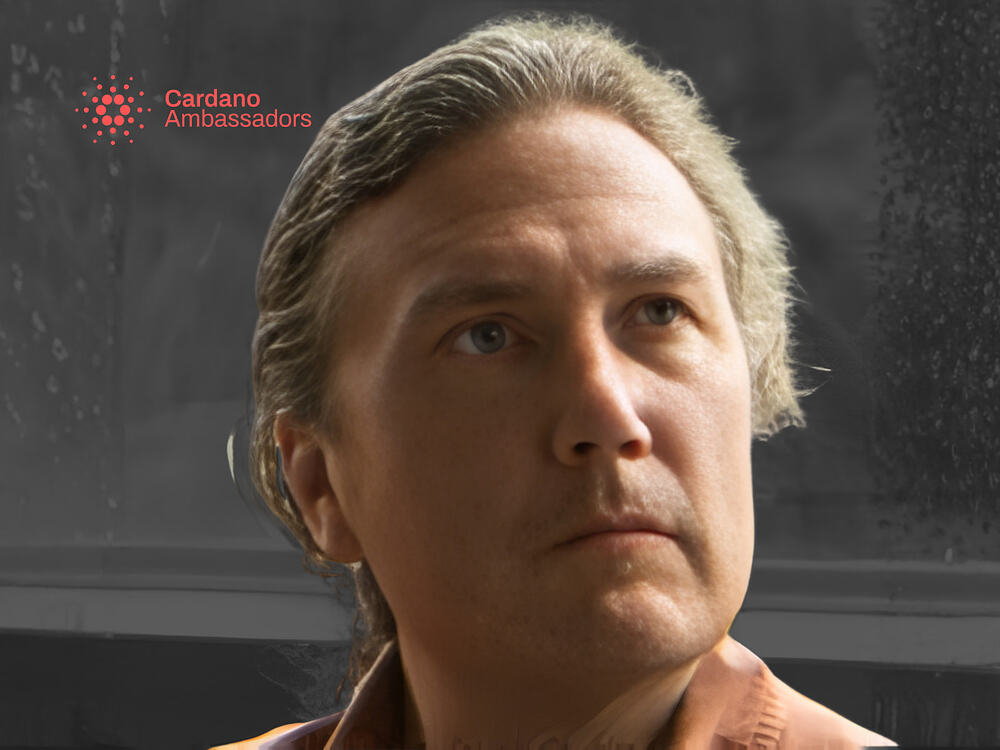Ambassador Stories, Journal #43: Robert Phair
Welcome to the 43rd journal of the “Ambassador Stories” series ! 
New stories will be shared with you, whenever new ambassadors join our ranks and provide their stories.
You’ll be able to enjoy the various, unique stories of our Cardano Community Ambassadors: what motivated, and still motivates them, to be part of this amazing and wonderful community?
The Cardano Community Team would also like to thank the Ambassadors for all their continued efforts and participation in sharing their stories with us.
Please read all about Robert Phair down below!
Robert Phair, Ambassador:
Robert recently joined the ranks of Cardano Ambassadors. Many of you may already for his frequent contributions to the Developer Portal
Alright, Let’s Dive Right In!
1) Tell us a little about yourself. What is your background?
I’ve supported professional and academic communities as a systems administrator / analyst and ad-hoc software developer since the late 1980’s when the public Internet was first getting launched. I worked with SMEs to provide them with Internet access & software before mainstream services for this existed: and had already been doing this for several years when the first web browsers & sites came out.
Even then the new industry was pushing towards closed source solutions, and the trend towards proprietary relationships and “walled gardens” was still alive & well when the first cloud services came out a few years later. Through this decade or two, I always pushed clients and associates towards open source solutions which were generally better in every period for every application.
2) How did you get interested and involved with Blockchain/Crypto?
I’d taken a couple of years off to live in Asia where I found I could work with more intensity and longer hours on creative projects. In 2020 I found a number of markets were collapsing but also noticed my 30 year skill set allowed me to do all the things different people would do in a small blockchain enterprise: software deployment, developer operations, design, marketing, networking, accounting, and investment.
So I decided to convert what business capital I had left into blockchain resources, and realign my business towards the secure asset storage that I believed everyone would need in this new economy… and to developing better workflow methods from the huge amount of documentation I found myself building from what worked for my own enterprises: which I soon began publishing as open source.
3) Why Cardano?
The arrangement of both technical features and human / organisational resources in the Cardano ecosystem is more finely distributed than in any other large blockchain. For instance, operators at entry level can view the entire chain by running a Cardano node on elementary hardware: something you’d never see on Solana which at this point only exists as an enterprise service.
I’ve seen so many elite enterprises fail over the years I know the only sustainable ones will be those which ordinary people can build and rebuild for themselves. This is likely also to be true for assets and the things people choose to do with them — especially real-world interactions like RWAs and supply chains — and most importantly DeFi relationships between individuals like lending and trades, without the inevitability of centralised intermediaries.
4) How are you contributing to the Cardano Ecosystem as an Ambassador?
My speciality has always been documentation & standards. In the gunslinging world of cryptocurrencies I get the idea others consider these to be “boring” and in fact Cardano agencies consistently overlook the CIP (Cardano Improvement Proposal) process in views of the ecosystem. Yet I’ve seen how every Cardano business and market started with some kind of technical standard, due to my long term involvement in the CIP process.
After four years as a CIP Editor, with many efforts to bring greater awareness about CIPs to the Cardano community, I sought Ambassador status to perhaps get better reach & results from this work. There is still a prevailing belief that standards are only produced by, and only usable by, larger organisations: even though the Internet itself is a counterexample.
Likewise, Cardano’s documentation is also a shared resource that anyone can improve: as with my long term involvement as an editor & portfolio curator on the Cardano Developer Portal, as well as other ecosystem projects. The Cardano community needs to be inspired by writing, not just video: maintaining the unique value of the printed word which has always been able to persuade the indifferent.
5) What is your future vision for the Cardano Ecosystem?
Cardano’s UTxO basis holds unique potential for finely distributed DeFi, which it will achieve once well-funded Cardano middle-tier developers stop trying to duplicate the account-based systems of other blockchains, and to finally support true peer-to-peer economic activity.
Locking funds in centralised contracts and pools is in its last few years of having any perceived value. The future generation will want their Cardano funds to remain in their own possession: tagged for the next trade, loan, investment, or any combination of these. Those interested in finding out more can follow the “DeFi Kernel” project pilot.
6) What is your personal message to the Cardano community?
Whatever you might lose — whenever you take a chance on doing the unconventional thing your heart calls you do to — you will get back many-fold if you continue to share your discoveries with others and to work selflessly and generously on whatever you most strongly believe in.
Be part of the conversation! Like, follow, and share Robert’s work. For more on Robert Phair and COSD, visit GitHub, X (formerly Twitter), the CIP summary page, or the stake pool website.
-—
We are truly blessed with such motivated community members we have in our ecosystem! Thank you all for reading, and don’t forget to leave your comments/likes and give our Ambassadors some Cardano community ![]() and follow their work!
and follow their work! ![]()
![]()
Until next time, with new people and new Ambassador Stories! ![]()

